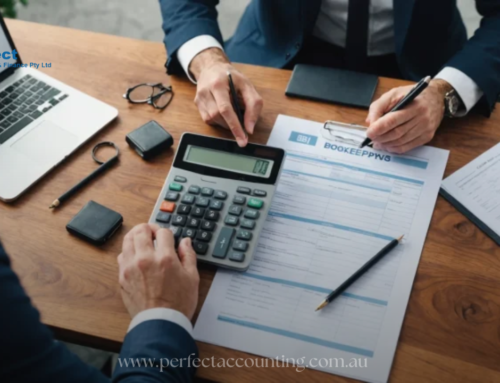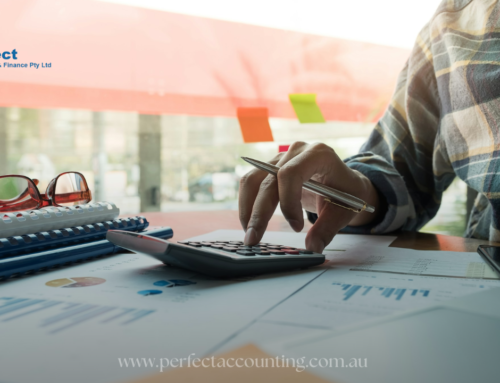Running your own business as a sole trader can be exciting—and at times, a little overwhelming. You get to be your own boss, choose your hours, and follow your passion. But there’s one part that many small business owners dread: accounting.
Let’s face it. Unless you’re a numbers person, managing finances can feel like speaking another language. But don’t worry. This guide is written in everyday language to help you understand the basics of sole trader accounting and how to stay on top of your business’s finances—with confidence.
And hey, we’ve got a smart solution to make your life even easier: Perfect Accounting, your trusted accounting agents who’ll take care of the hard stuff so you can focus on growing your business.
What is Sole Trader Accounting?
In simple terms, sole trader accounting is how you manage the money side of your one-person business. It includes tracking your income and expenses, paying taxes, and keeping accurate financial records.
As a sole trader, you and your business are legally the same entity. That means any profit the business makes is your personal income—and you’re responsible for declaring it to the Australian Taxation Office (ATO).
Why It’s Important (Even If You Hate Numbers)
Imagine this: Dave is a talented plumber who started his own business. He’s amazing at fixing pipes but completely lost when it comes to finances. After a few months, his receipts are stuffed in drawers, and tax time turns into a nightmare.
Sound familiar?
Without clear accounting, you could:
- Miss out on tax deductions
- Get hit with penalties from the ATO
- Lose track of your cash flow
- Struggle to grow your business
With the right help and systems in place, though, it becomes a whole lot easier.
Step-by-Step: How to Do Sole Trader Accounting
Step 1: Get an ABN (Australian Business Number)
Before doing anything else, make sure you’ve registered for an ABN. It’s free and easy to do online.
Step 2: Open a Business Bank Account
Keep your personal and business finances separate. This makes it easier to track business income and claim expenses.
Step 3: Record All Income
Track every dollar your business earns. You can use accounting software like Xero or MYOB, or go old school with a spreadsheet.
Step 4: Track Your Expenses
You can claim many business expenses to reduce your taxable income. Think tools, work-related travel, phone bills, internet, and even part of your home office if you work from home.
Step 5: Set Aside Money for Tax
As a sole trader, tax isn’t automatically taken from your income. A good rule of thumb is to set aside around 25-30% of your income for tax.
Step 6: Lodge Your Tax Return
At the end of the financial year (June 30), you’ll need to lodge a tax return and declare your business income.
Top Tips for Stress-Free Sole Trader Accounting
1. Use Accounting Software
Cloud-based tools like Xero, MYOB, or QuickBooks make tracking easier. You can even scan receipts with your phone.
2. Keep Receipts and Records
The ATO requires you to keep records for at least five years. Digital copies are fine as long as they’re clear and complete.
3. Hire a Professional Accountant
Sometimes, it’s just better to leave it to the pros. A good accountant will help you:
- Maximise your tax deductions
- Avoid mistakes
- Save hours of time
And that brings us to our top recommendation…
Let Perfect Accounting Handle It For You
Perfect Accounting is a team of expert accounting agents who specialise in sole trader accounting. Whether you’re a graphic designer, tradie, consultant, or online store owner, they’ll make sure your books are tidy, your tax is on track, and you’re not paying a cent more than you should.
Why Choose Perfect Accounting?
- Simple, fixed pricing
- Friendly support that explains things in plain English
- Fast turnaround times
- Easy online appointments
You didn’t start your business to get stuck doing admin, right?
Let Perfect Accounting give you back your time—and peace of mind.
Frequently Asked Questions
Do I need to register for GST?
Only if your annual income is $75,000 or more. Learn more about GST for sole traders.
Can I claim home office expenses?
Yes! If you work from home, you can claim a portion of your rent, electricity, and internet. Here’s how.
What if I make a loss?
You can carry forward business losses to future years or offset them against other income. Talk to an accountant about the best strategy.
Final Thoughts: Take Control Without the Stress
Being a sole trader gives you freedom—but with that comes responsibility. By understanding the basics of sole trader accounting, keeping solid records, and getting the right support, you can avoid surprises and build a successful business.
And if you’re ready to make life simpler?
Visit Perfect Accounting today and get expert help you can trust. Your future self (and your bank account) will thank you.







